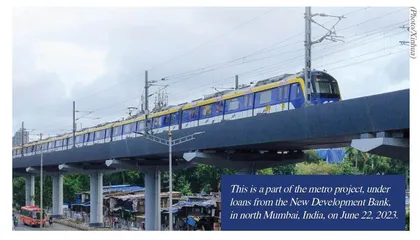A New Approach for Global Economic Governance: The New Development Bank’s Role
作者: [Brazil] Dilma Rousseff

The Global Economic Dynamics and its Challenges
In our contemporary era, the world grapples with a profound sense of uncertainty, marked by a confluence of crises: a severe climate crisis, a stark surge in inequality, sluggish economic growth, and the rise of trade protectionism. These challenges intertwine with the disruption of global value chains, geopolitical turbulence and multifaceted conflicts, collectively fostering an environment where instability and insecurity have become the norm. The recent escalation of inflation and the resultant monetary policies, which have triggered interest rate hikes, bank failures, and excessive leveraging, have amplified the specter of recession across developed economies, exacerbating volatility across credit, currency, and capital markets.
It is apparent that the financial neo-liberalism practiced in developed countries has caused credit and finance to become “headwinds” rather than drivers for the productive economy. They have become real hindrances and the center of unbridled speculation that sucks all resources dry. Thus, a growing concentration of income and wealth in the hands of very few in the Global North has brutally increased inequalities, while simultaneously also creating more inequality, speculation, instability, and successive crises in the Global South. The weak regulation of international finance has failed to prevent recurring crises linked to the financialization of Western economies. The regulatory measures recommended by the G20 have not been able, in fact, to prevent the occurrence of either new speculative bubbles or excess liquidity problems and high leverage that have led to new bank failures.
The globalization trend that promoted more internationalized markets, trade, industrial production, services, currency flows, bonds and shares, as well as information has been receding ever since the 2008/2009 global financial crisis. Before the crisis, global value chains, one of the pillars of globalization, were growing at a faster rate than other components of GDP but have since slowed down. This downturn was followed by a rapid recovery in 2010 to 2011 and since then, with the exception of 2017, global value chains have been growing at a slower rate than global GDP. This slowdown of globalization has resulted in lower economic growth and fragility in global value chains and it is further deepened by the pandemic. Protectionism, decoupling and de-risking policies, and sanctions have acted to intensify these already serious fractures inherited from the great financial crisis.
More recently, the weaponization of the US dollar through sanctions in geopolitical conflicts has raised the price of food and energy, further fragmenting supply chains. Blocking the access of sovereign nations to their own international reserves, as well as other practices based on the unacceptable notion of extraterritorial jurisdiction, has created an environment of distrust regarding the safety of assets kept in Western financial institutions.
At the same time, the United Nations has not been able to cope with the growing geopolitical tensions, nor have the so-called Bretton Woods institutions -- the IMF, the World Bank and the WTO -- shown they are capable of reversing the trends of geo-economic fragmentation and growing social fragility.
Another clear symptom of the lack of coordination in international governance is the alarming fact that the climate crisis and the UN’s 17 Sustainable Development Goals (SDGs) are not being addressed in accordance with the decisions taken at all the UN Conferences of the Parties (COPs) and other international environmental forums that have taken place in the last decade. The capital contributions to developing countries that the rich countries had pledged to make since COP 15, the Agenda 2030, which defined the Sustainable Development Goals, and even the Paris Agreement, have never materialized.
Nevertheless, macroeconomic uncertainty prevails at a global level on account of the effects of high inflation and of monetary policies that drive interest rates upwards, giving rise to bank failures and excessive leverage. The end of quantitative easing and the adoption of quantitative tightening also contribute to increase the risk of recession in developed countries and to intensify the volatility of credit, currency and capital markets. For their part, developing countries have generally suffered the effects of interest rate increases and exchange-rate devaluation. The high indebtedness of these countries, caused largely by neo-liberal austerity policies, is now maximized by the stratospheric impact of the strong dollar exchange-rate policy, as well as of the inflationary spiral, on their external debts, with many reaching the threshold of default.
In this setting, rather than mere objective phenomena that weaken the patterns of globalized economic and financial relations, notions such as “decoupling” and “de-risking” are indeed political weapons used to curtail the rise of new players in the international arena. The very dynamics of globalization, although currently weaker, has given rise to a deep interdependence among economies and regions of the world, an interconnection that has grown in tandem with the increase in international trade, the greater density of global value chains and the multiplication of capital flows. Disconnecting the world has thus become unworkable, and any attempts to erect insurmountable barriers between countries is nothing but an extemporaneous return to the Iron Curtain.